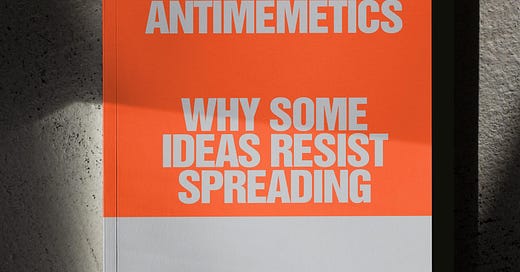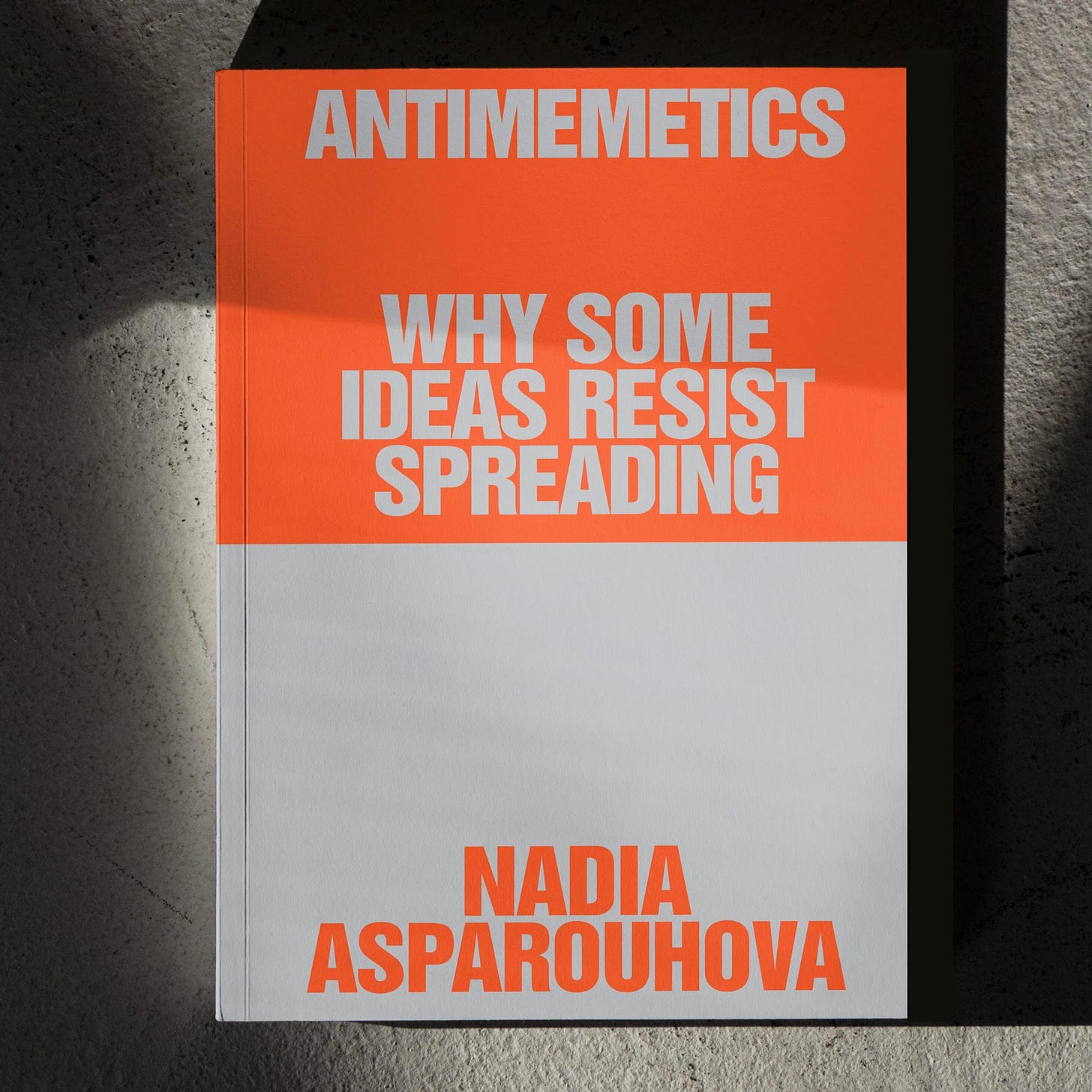It's easier than ever to share ideas. But in recent years, some of the most interesting ideas are burrowing deeper underground, circulating quietly among group chats and texts instead of public social channels.
I've watched these changes unfold while thinking about a book I read a few years back, called There Is No Antimemetics Division (or TINAD), a horror science fiction book by the pseudonymous author qntm. In TINAD, the world is overrun by antimemes, or ideas that actively resist being remembered or shared – despite their importance.
Antimemes exist in real life. They are a broad category of self-censoring ideas that includes taboos (things that everyone knows, but can't be said out loud), cognitive biases (things that we can't see about ourselves), or memory lapses (things we know we ought to be doing, but keep forgetting to prioritize). Antimemes grab our attention in the moment, but we struggle to keep them top of mind. This sort of forgetting occurs both collectively (ex. taboos) and individually (ex. cognitive biases).
I read TINAD shortly after its release in 2021. Afterwards, I started collecting scraps of thoughts about antimemes in a text file that I kept on my desktop, which I named antimemetics-notes.md. At some point, this file grew large enough that I thought I might try to write a blog post about it. I tried and failed at this task many times, partly because it felt like the world I wanted to write about was still evolving, and partly because – true to their name – antimemes are hard to think about directly for too long.
Since TINAD was first published, more and more people I know seem to have found their way to its pages. The book (and its author, qntm) is one of those wildly successful self-publishing stories: while it wasn't published or promoted through conventional channels, enough people fell in love with its premise that qntm recently signed with Penguin Random House to re-release it for a wider commercial audience.
I think qntm is one of the best science fiction authors of our generation. Still, I longed for a proper nonfiction treatment of antimemes. It seemed that such a consequential idea needed an analysis that was grounded in the real world, not just a fictional one. While qntm first coined the term "antimeme" back in the late 2000s, the concept has found fresh relevance in recent years, I think because it helps us understand the next phase of the social web: one that’s driven by private and semi-private online spaces, not just highly public ones.
Memes may dominate how we communicate online, but in the last few years, their rapid spread has also necessitated the birth of a parallel, shadow ecosystem, where the best ideas are paradoxically harder to find. Not everyone wants their ideas to go viral anymore. One friend writes a newsletter that he asks people not to share around. Another publishes their writing in a Google Doc, which is sent only to a small group of trusted people. My new favorite social app is a private, Twitter-like app that a friend created just for his friends.
Chasing virality is no longer a sufficient motive to explain why we do (or don't) share what we do online. But we still don't have the vocabulary to describe what we’re doing instead. Group chats have become a major platform for social communication in the last five to ten years, but hardly anyone has written about them, in large part – I think – because they can't. Group chats are self-censoring: unlike the public social web, we can only know what we've experienced, or what others are occasionally willing to share with us. The juiciest gossip is reserved only for its members (and those who accidentally stumble into a highly classified war chat).
I also think a lot of people, especially those who grew up in the Web 2.0 era, are weighing conflicting emotions around both wanting to withdraw from the chaos of public social web, while also feeling vaguely guilty about checking out. It's much more comfortable to live in our group chats and DMs, but doesn't it feel a little strange to watch the world burn from the safety of our miniaturized abodes? Shouldn't we....do something? But what?
I've found myself wishing for a narrative that didn't just feel like complaining about social media today, nor pining for a simpler time where we didn't have to beg for likes and shares. The past is the past: we need to let it go. Instead, I wanted to take a hard, unflinching look at where we are today, and try to figure out how to make meaning from our lives with the constraints we currently have.
I wasn't the only person thinking about the future of the social web. In 2019, Kickstarter and Metalabel co-founder Yancey Strickler published an essay, titled "The Dark Forest Theory of the Internet," about why he felt increasingly uncomfortable interacting in public spaces online. The essay attracted a lot of attention, and eventually Yancey formed The Dark Forest Collective with a few likeminded collaborators, including Venkatesh Rao and Maggie Appleton. They published an anthology of their writing early last year. The first print run sold out in the first 72 hours. A few months later, they announced that they were looking for more ideas to publish under the same label.
I hadn't properly met Yancey before, but it turned out we were admirers of each others' work – making slow, lazy circles around the same cluster of ideas. And that's how my half-abandoned Markdown file of notes began preening itself into the book I'm sharing with you today. It’s called Antimemetics: Why Some Ideas Resist Spreading.
I didn't really mean for this to turn into a book. I wasn't sure what its final form would be when I sat down and started writing in May of last year, from the warm and sun-filled loft bedroom of a rented summer home in Manhattan Beach. Mostly, I wanted an excuse to think about antimemetics. But the draft grew and grew, and it sprouted legs, and it began to wobble and toddle around, and a few weeks into dissecting and organizing my notes, I began to develop a fondness for the alien creature that had taken up residence in my head and heart. I coaxed this manuscript – an improbable mess of ideas that had so many false starts over the last three years – to grow at the same time that I watched my infant son grow: rolling onto his stomach, rocking on his hands and knees, crawling and climbing up the stairs, pulling himself up and cruising from couch to coffee table.
In December, my son finally stood up and walked seven steps on his own, before he tripped and fell. But – realizing what he had done, and the possibilities he had just unlocked – he stood up and did it again, and again, and again, shrieking and rolling and laughing with joy and he stood, and walked, and fell, and stood, and walked, and fell, and stood, and walked again. A week later, I turned in the final draft of my manuscript for Antimemetics.
Publishing with the Dark Forest Collective felt like the right way to release this book. Antimemes are delicate and messy and hard to look at; they would be swiftly crushed in the hands of a publisher trying to juice it up and make it "go viral," like a flower ground under the heel of a shoe.
I had thought of this book as a "fun summer project," but as my writing wore on into the winter, I realized that antimemes were an overarching meta-theme of much of my life and interests: whether that's the unseen costs of infrastructure, the need for privacy in our online lives, how talent ecosystems are forming from the memetic spread of apocalyptic thinking, how bureaucracies keep ideas safely hidden, or how our attention is being hijacked by doomscrolling. All of these ideas make an appearance in Antimemetics.
And, of course, this book is in some sense a sequel to my first book, Working in Public: The Making and Maintenance of Open Source Software. (While writing Antimemetics, I joked to myself that I would call it Working in Private.) I wrote that book partly because I felt that what was happening to open source developers – who, in the face of overwhelming demand for their attention, were withdrawing from public online spaces – was going to happen to all of us. I even referenced the Dark Forest thesis in my initial book announcement.
I barely told anyone I was working on this book. This makes Antimemetics itself a sort of antimemetic experiment. I am putting my faith – as always – in my writing speaking for itself, and earning its right to spread from person to person. So, if I've written something here that resonates with you, please share it with your friends – and buy the book!
Antimemetics is now available for pre-order:
The first edition will be sold exclusively on Metalabel; we’ll make it more widely available soon after. We plan to release Antimemetics in late May of this year.
Thanks, as always, for reading and supporting my work.





i mean, like, yes, pre-ordered immediately
Love your writing (however infrequent, it's that much more of a treat when I see a post here), ordered a digital since it's such a limited supply right now and hard copy isn't such a huge priority. I've been very interested in discourses around attention and the flow of ideas, so this sounds amazing. Thank you!